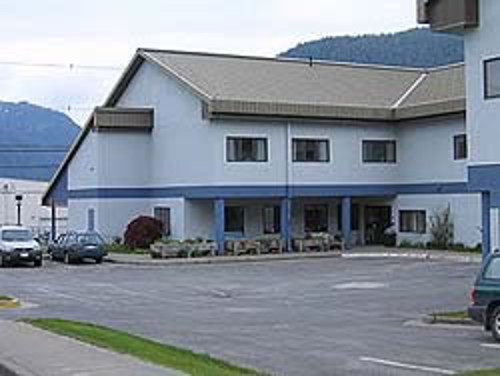Petersburg schools Monday got one step closer to have a reduced rate for electrical power but the local hospital is not yet in on the discount. That was despite pleas from hospital officials seeking some savings in their budget.
The assembly this spring is considering whether to set an eight-cents-a-kilowatt hour rate to some buildings owned by the borough. Initially that discussion included the borough owned school and hospital facilities. However, earlier this month, the assembly decided only to offer the discount to the schools and pool and advanced an ordinance in first reading with that change.
Petersburg Medical Center CEO Liz Woodyard asked for the hospital to be included in the reduced rate.
“The savings of 41,000 per year would be very helpful to the hospital,” Woodyard said. “When we first started meeting we met with borough school and hospital representatives to talk about ways to be more efficient and to reduce costs that all of us will be having because of course with the state budget we’re getting cuts and various federal programs are going away and so we thought it would be a good way to reduce some of the burden on both the schools and the borough buildings and the hospital.”
The reduced rate was one idea for spending down a surplus that Petersburg Municipal Power and Light has built up. It’s also seen as a way to help the bottom line of borough departments, the schools and hospital and to ease the budget pressure from anticipated loss of federal funding.
Assembly members have been reluctant to use the money generated by all electrical customers for just public government buildings.
Medical center board president Darlene Whitethorn asked the assembly to reconsider. “It’s not a large amount of money and as Liz said we want to use that money either capital projects which we have a lot of ‘em coming up or put into our building fund because that may be an issue down the line too,” Whitethorn said.
The initial list of 15 borough buildings could have totaled nearly 238,000 dollars in lost revenue to the electrical department. Of that the school’s savings is estimated at just over 96,000 dollars a year and the hospital would see savings of $41,000.
Assembly member Bob Lynn voted against a reduced rate for any of the buildings earlier this month and said he’d continue to vote that way. “I think it’s inappropriate for us to take an enterprise fund, take funds out of it and let other people have reduced rates but then allow the rest of the users to pay increased rates,” Lynn said. “We’re talking just with what we’ve changed here, almost 100,000 dollars a year. So somebody’s got to pick up the difference. I’m not against funding schools and hospitals but I think this would be an inappropriate way to do it.”
But some on the assembly wanted to include the hospital in the rate break. Jeigh Stanton Gregor tried unsuccessfully to make that change earlier this month. And he moved again to amend the ordinance to include the schools and hospital.
“It struck me as a way that Power and Light will still be solvent and we can help somehow two of the key pieces of community infrastructure in the school and the hospital,” Stanton Gregor said. He thought Power and Light could sustain the reduced rate for those buildings without losing money.
Mayor Mark Jensen has also opposed the rate break because the money paid into the electrical department has come from all Power and Light customers. “One thing we have to keep in mind why the electrical enterprise fund has this extra money is because we raised rates higher than what they needed to be to keep them within their surplus budget that they needed years ago so that they could move the Power and Light building out to Scow Bay and 10 years or so ago when I got on the council that was overturned but we kept building up the money and now we have that money, if I’m not mistaken that’s how the excess money got there,” Jensen said.
The amendment to include the hospital in the rate break failed 4-2 with Stanton Gregor and Eric Castro the only yes votes. The unchanged ordinance passed 4-2 with Lynn and Jensen opposed. It still has one more reading before taking effect.












